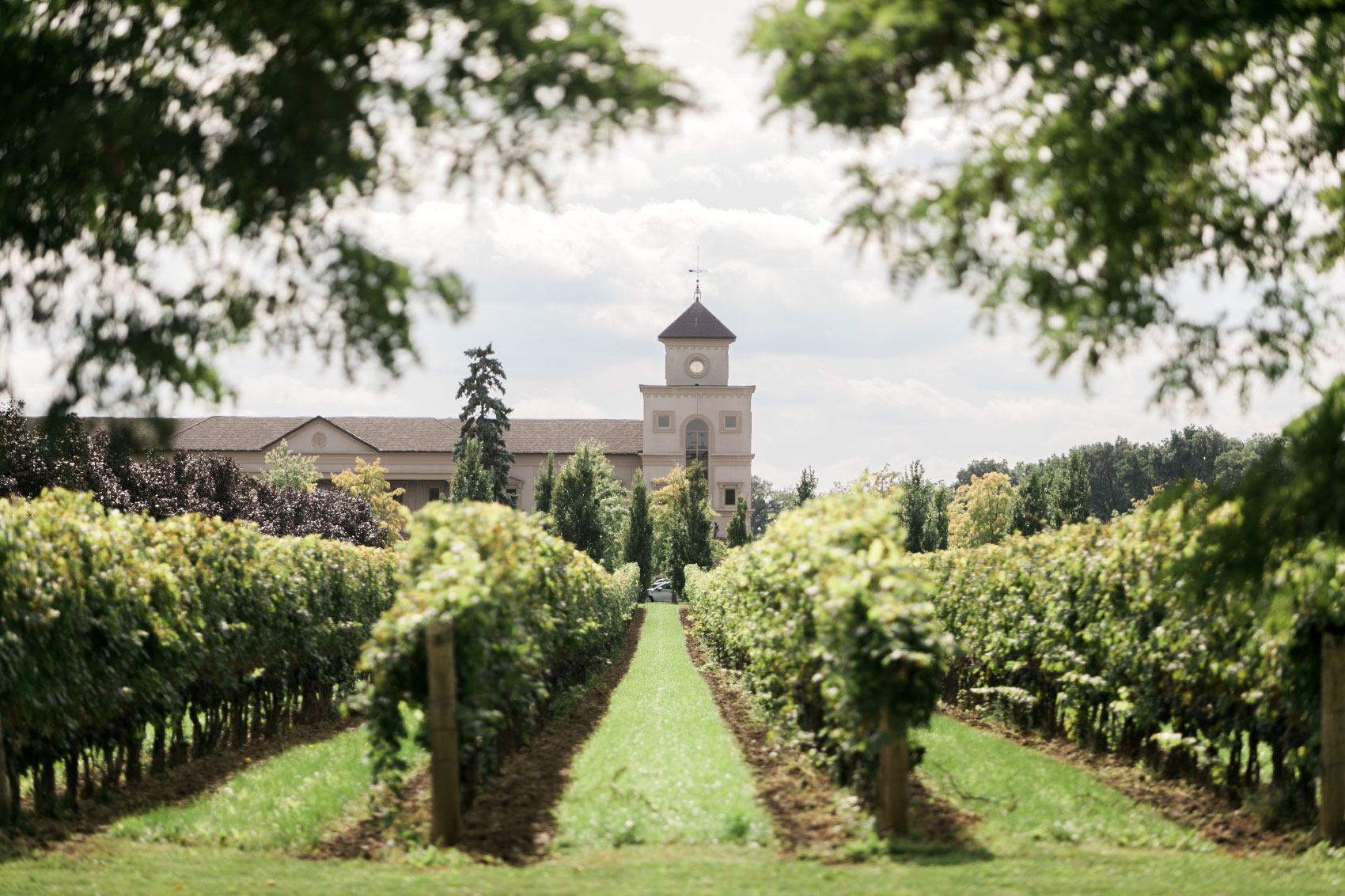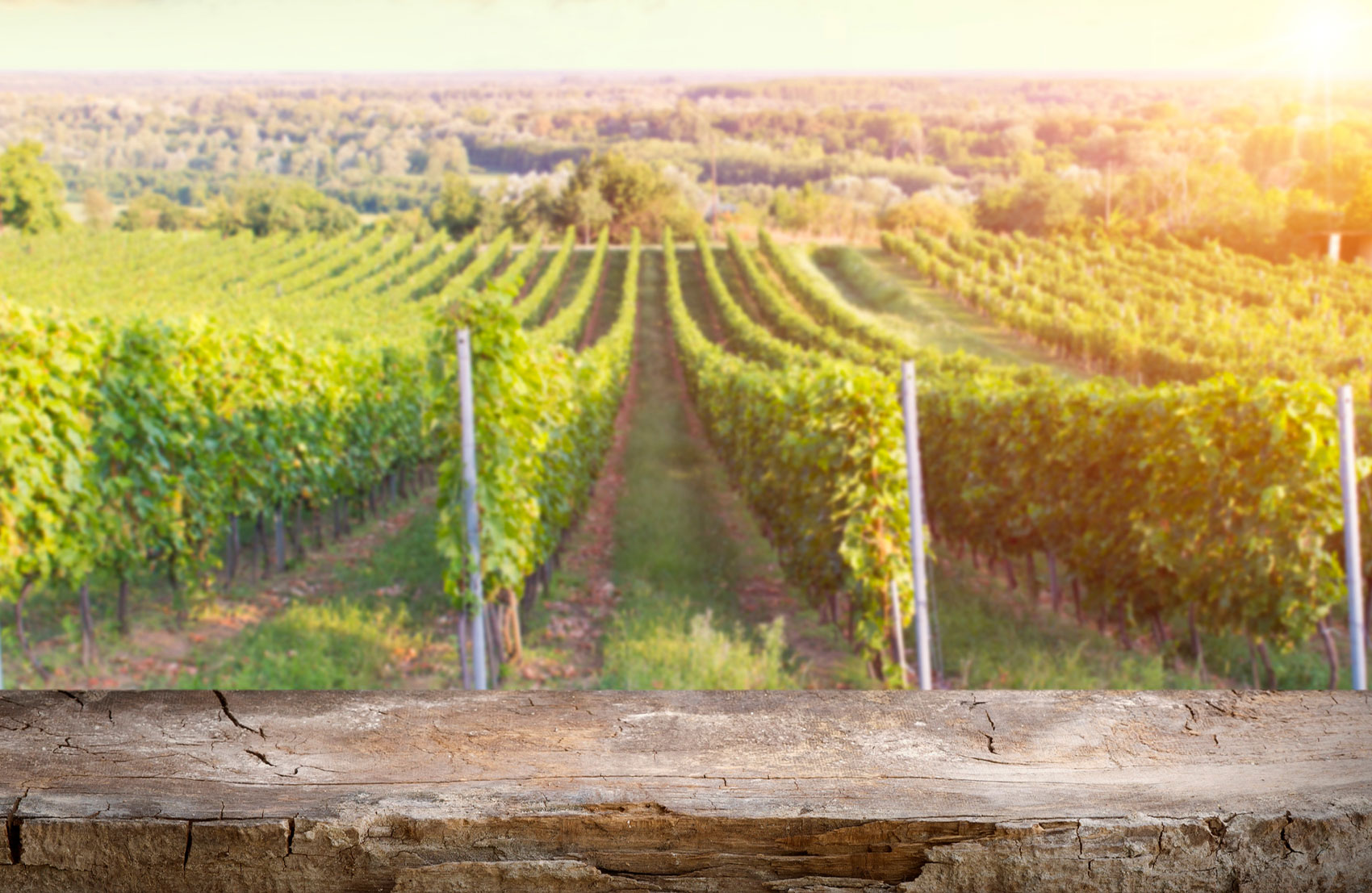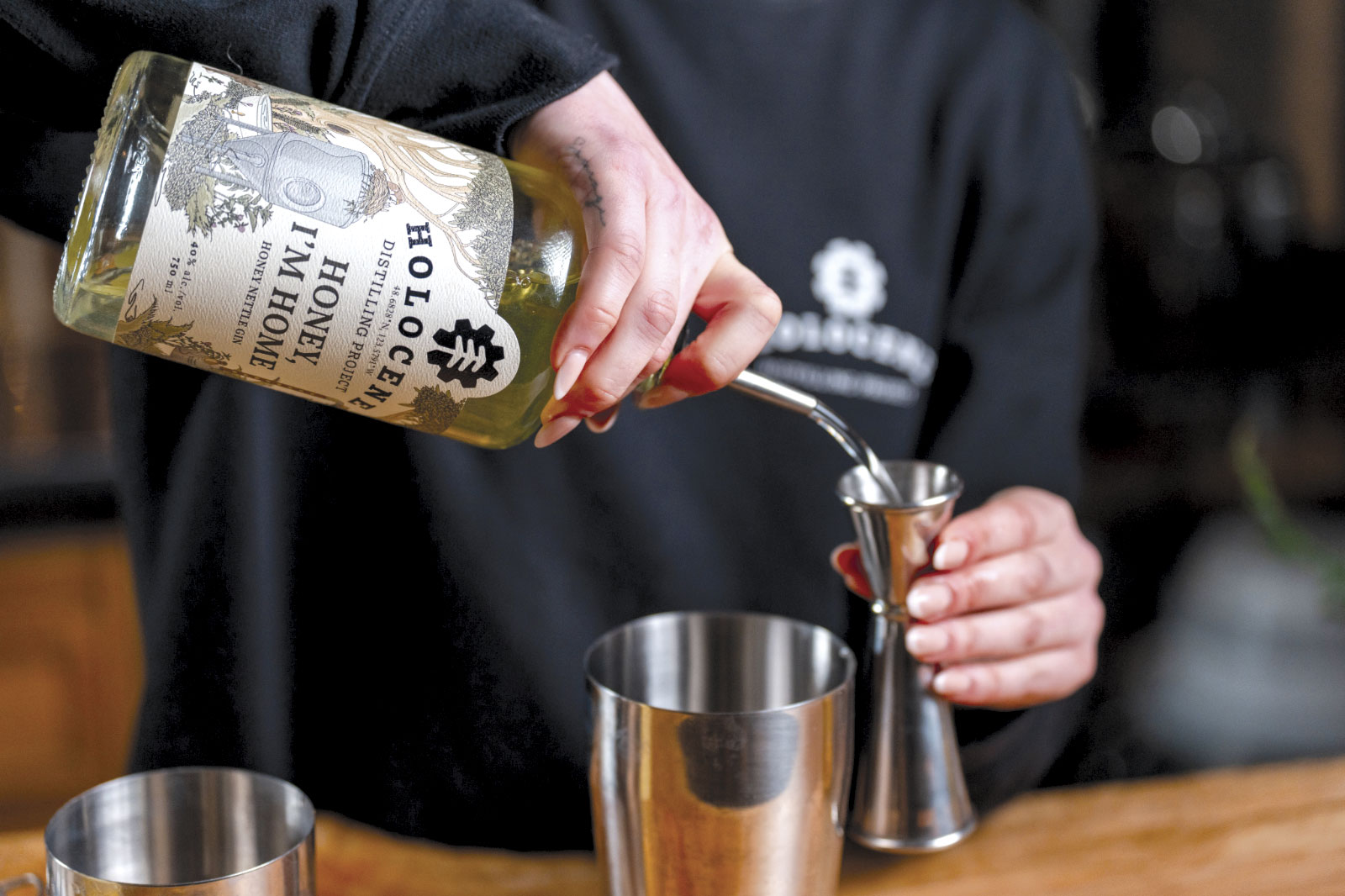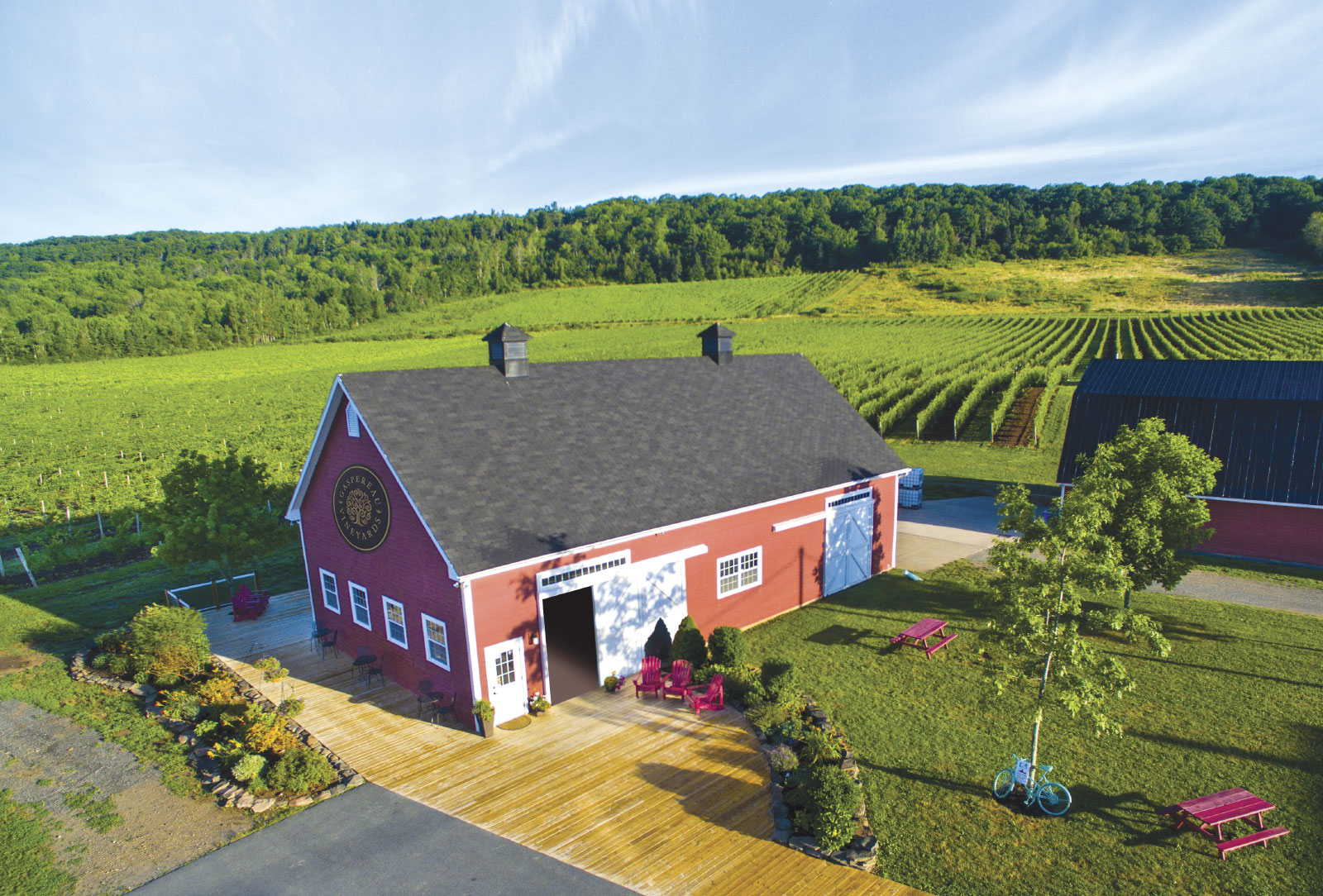Entrepreneurs from the get-go, Ontario sisters Angela Marotta and Melissa Marotta-Paolicelli always knew that one day, they’d somehow be in the food and wine business. It just took them a few years to realize they’d be following those dreams together.
The sisters fell in love with Niagara-on-the-Lake, Ont., during their many visits as children with their family. “Given our European background – we’re Italian – we really connected with [Niagara-on-the-Lake],” said Angela. “We really love wine and food. Some of our most memorable moments with our family are being at a great restaurant, ordering a special bottle and enjoying a really good meal. I think we always knew that at some point in our lives, we’d be doing something related to wine, food and hospitality.”
In 2006, the sisters – who are only 19 months apart in age – heard about a peach orchard for sale next to the renowned Peller Estates winery. At the time, Angela was working in real estate and Melissa was an interior designer, but they knew the opportunity had arrived to create something new.
A year later, the first vines were planted. In 2010, just three years later, the first vintage was produced, focusing on Bordeaux varietals including Merlot, Cabernet Franc and Cabernet Sauvignon. A few years after that, in 2014, Two Sisters Vineyards opened its doors.
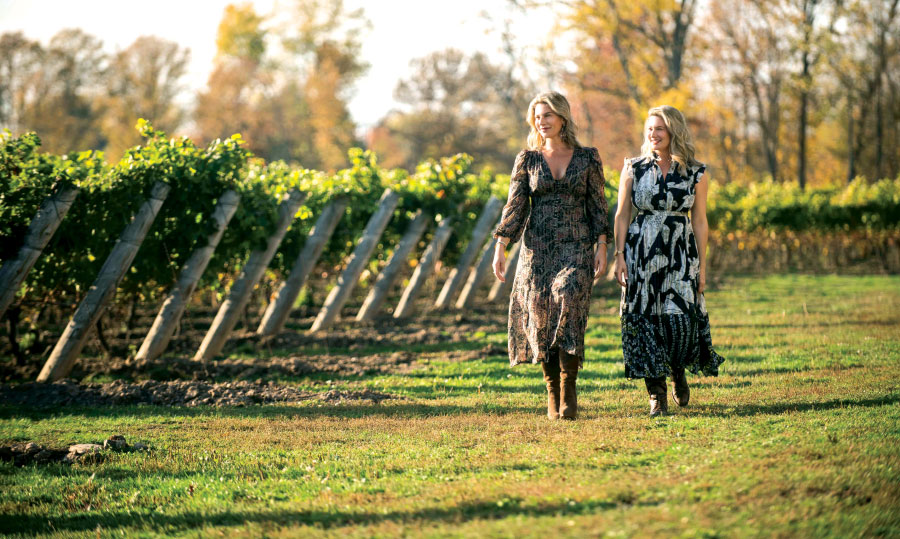
Over the years, they gained land; they now farm more than 130 acres of vines in and around the Niagara-on-the-Lake region. They have also planted more varieties. In addition to the Merlot, Cabernet Franc and Cabernet Sauvignon, they now grow Petit Verdot, Chardonnay, Riesling and Sauvignon Blanc. They make roughly 20 wines, including a Riesling icewine, a Cabernet Sauvignon icewine and four sparkling wines.
One especially popular offering is the Blanc de Franc, a traditional method sparkling wine made with 100 per cent Cabernet Franc, a red wine grape. Gentle pressing, however, leaves the wine with only the faintest trace of colour, and it then undergoes a second fermentation in the bottle, aging for more than two years on lees.
Another customer favourite is the Eleventh Post, which they first made in 2011, a proprietary blend of Merlot, Cabernet Franc and Cabernet Sauvignon. And they harvest select lots specifically for making their popular Margo Rosé.
Wines are currently only for sale at the winery and online at twosistersvineyards.com, through their wine club, and from select LCBO locations and restaurants throughout Ontario, including Toronto. However, as Two Sisters Vineyards celebrate more than a decade in business, the sisters are looking to expand sales beyond Ontario and into other provinces.
“There are a lot of regulatory restrictions in Canada,” said Angela. “But change is coming and I’m looking forward to it.”
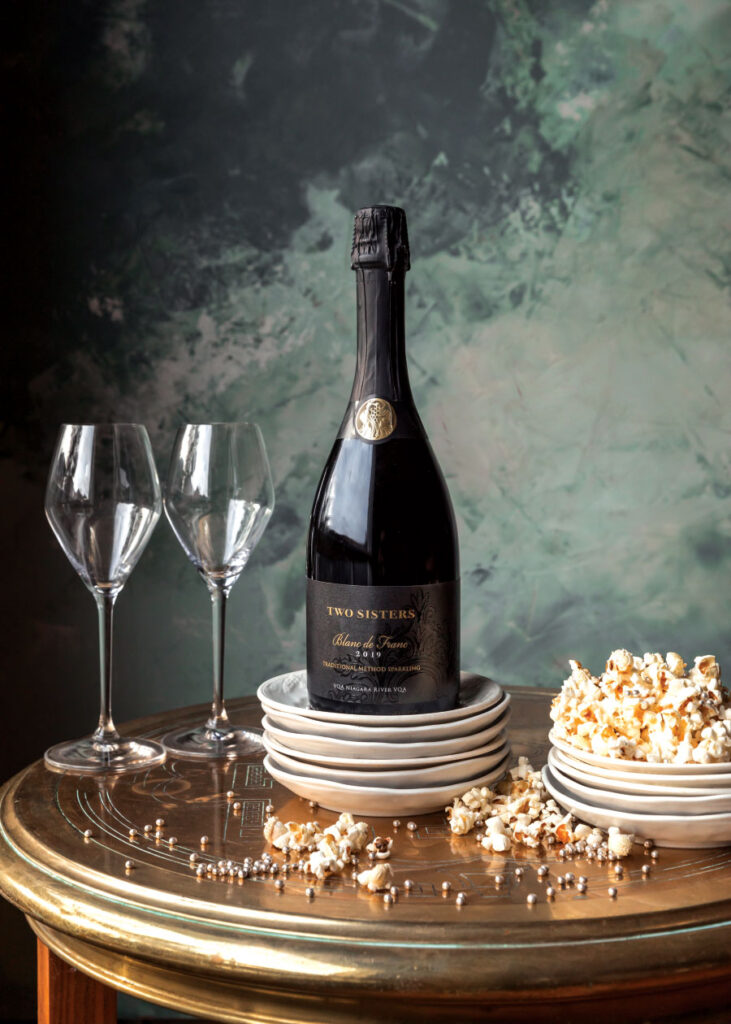
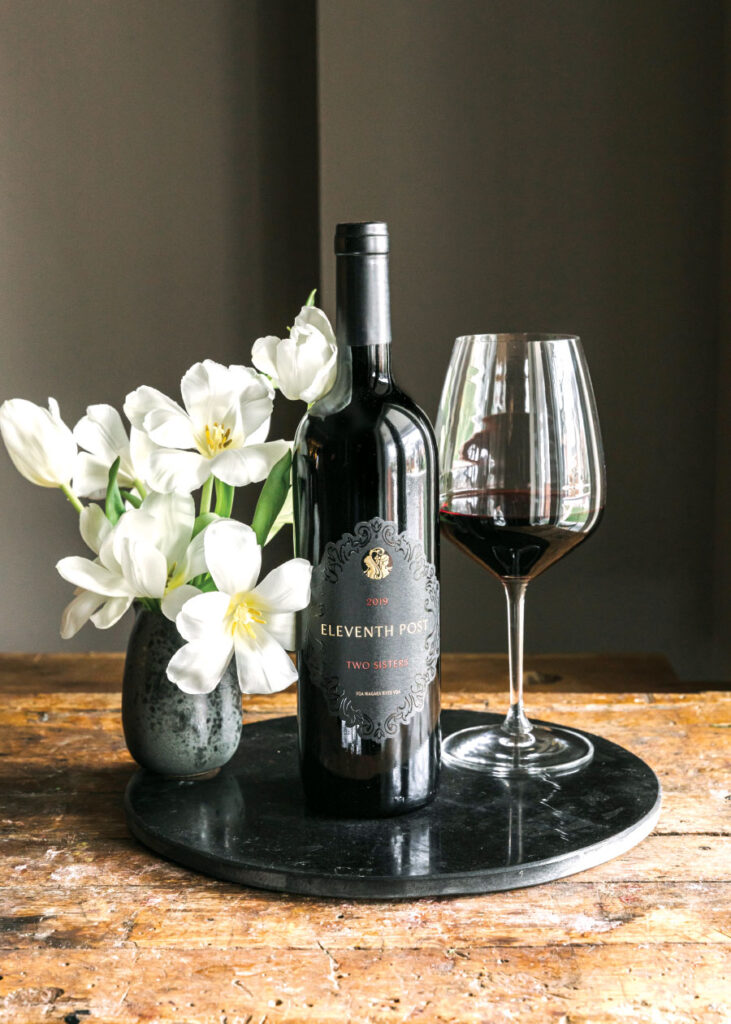
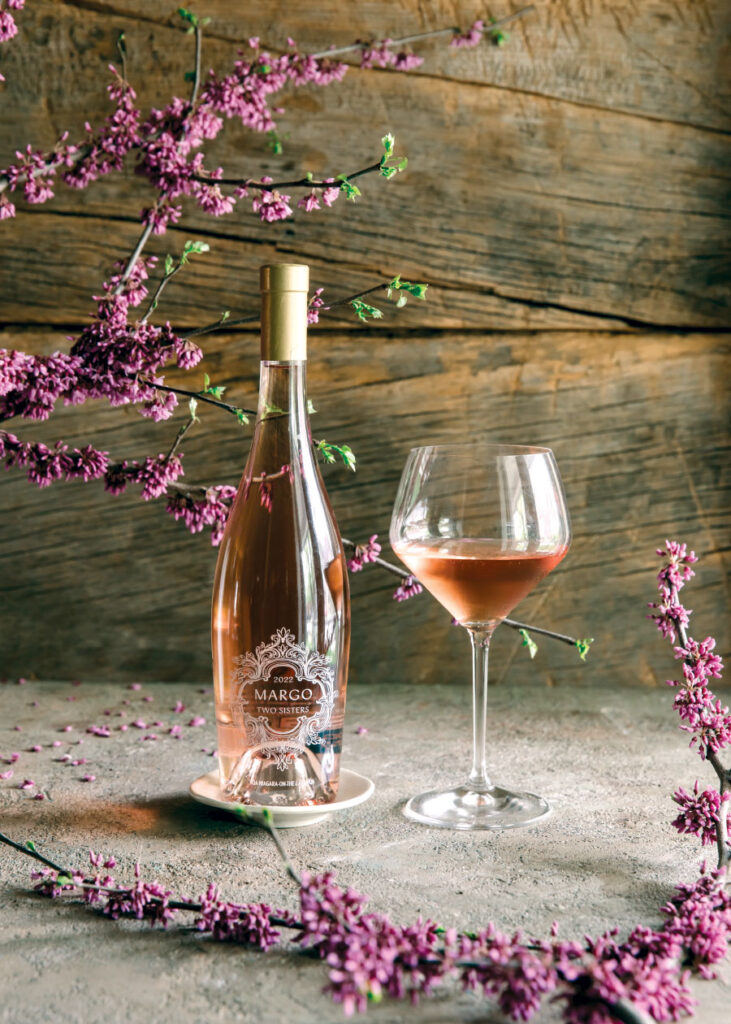
Angela and Melissa work together as the winery’s co-proprietors, overseeing planning, product development and customer service. Angela ensures their standards are always met in the vineyard and in the production facility, while Melissa focuses on staff training and direct marketing initiatives for consumers, as well as product design, messaging, packaging, events and winery and culinary experiences. The winery’s on-site restaurant, Kitchen76, offers an Italian-influenced menu focused on the best regional ingredients.
“Guided by our belief that food and wine are inseparable, we envisioned a dining experience that would perfectly complement the Two Sisters Vineyards wine experience,” said Melissa. “Kitchen76 is built on a foundation of excellence in customer service, knowledgeable staff and a commitment to using the freshest local produce and highly respected purveyors.”
This year, Angela and Melissa are also opening Stone Eagle Winery, an estate set on a beautiful 30-acre plot of land. The new property’s vineyards – including some hand-harvested blocks – span across Niagara-on-the-Lake, and the new space features two underground cellar floors as well as dining experiences and a space for special events.
It’s hard to be high-volume and then scale to something premium. Just start with premium.
Angela Marotta
The Stone Eagle wines were originally sold as an ultra-premium wine line under the Two Sisters Vineyards umbrella, but the line will now become its own entity. All production for both wineries, however, will be done at the Stone Eagle property. Like many fine wineries, the winemaking process begins in the vineyard, where the team focuses on minimal-intervention practices that allow the unique terroir of the Niagara River sub-appellation to shine through.
“When possible, our many vineyard blocks are vinified separately to ensure we capture the difference in each unique block, and so we can continue to fine-tune and learn from each site,” said Adam Pearce, winemaker at Two Sisters Vineyards. “Our winemaking and vineyard teams work very closely together to create optimal growing conditions for our vines and we employ an array of sustainable vineyard management practices.”
The right equipment is important for the Two Sisters team, too. A Gregoire EcoProtect 3 row recycling sprayer allows them to recapture more than 30 per cent of spray drift in the vineyard, Pearce adds. “Our sprays are carefully selected to maintain the health of the vines while being mindful of sustainability,” he said. “Specific treatments vary each year as they are tailored to the changing weather conditions and natural needs of the vineyard.”
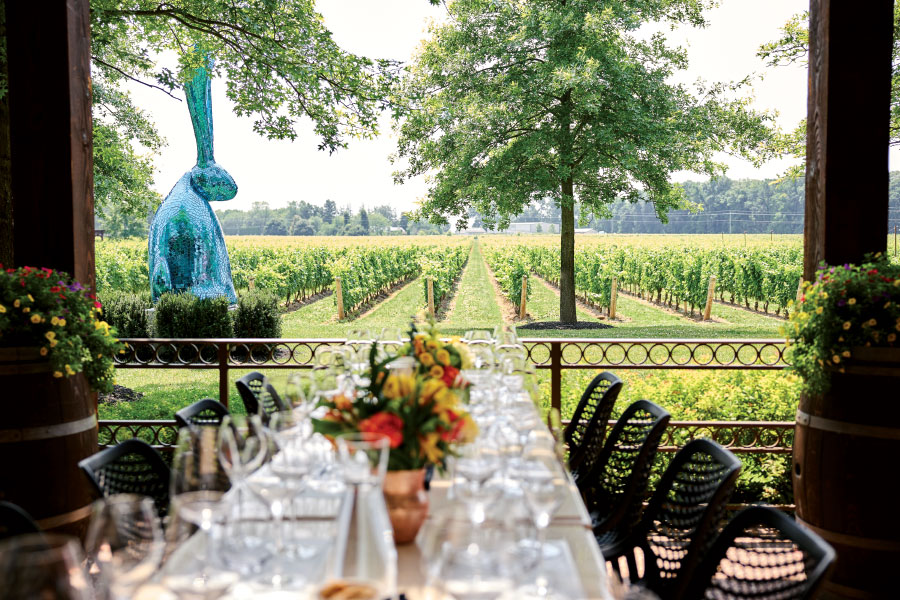
Later in the growing season, they use mechanical leaf removal around grape clusters to allow for sunlight exposure promoting ripening and flavour development.
“We recently purchased a Gregoire GL7 mechanical grape harvester, which allows for energy efficiency, minimized soil compaction and optimal harvest timing, allowing for harvest to happen when grapes are at their peak,” said Pearce, who is also a graduate of Niagara College’s Winery and Viticulture program. They use a Pellenc destemmer, while red fermentation takes place in LASI Mythos closed system fermenters. They have an extensive barrel aging program, too.
“We use an array of coopers of French and American oak barrels. These barrels impart distinct flavours and textures to the wines, contributing to the complexity and character of the final product,” said Pearce. “We are always trialling new products and equipment, looking for more sustainable and efficient farming practices and ways to reduce environmental impact.”
Indeed, taking care of the land for future generations is important for the team. The winery is certified sustainable by Sustainable Winegrowing Ontario, a program that focuses on three key pillars – the environment, economy and community – and helps to safeguard the province’s vineyards for future generations.
Listen to all customer feedback and react quickly when changes need to be made. If a wine event doesn’t result in sales … something isn’t working.
Giving back to the community is also a big part of the winery’s operations. The Marotta family pledged $10 million to help build the South Niagara Hospital, the largest financial gift in the Niagara Health Foundation’s history. They made a $15 million donation to St. Catharine’s Hospital (now the Niagara Health Marotta Family Hospital) in 2024, and in 2018, they donated $1 million to Niagara College for its innovation centre, now named the Marotta Family Innovation Centre. Gillian’s Place, an organization that seeks to end gender-based violence in Niagara, received a $1.5 million donation from the family in 2023 for the creation of the Marotta Family Centre for Violence Prevention and Outreach Support.
“We have poured our hearts into supporting the community that has supported us,” said Melissa. “We also keep our internal community strong at the winery, by promoting from within to encourage growth and staff retention.”
They are also proud members of Wine Growers Canada. “Their dedicated work with the government plays a crucial role in supporting the wine industry nationwide,” said Melissa. “Their efforts, especially in lobbying for interprovincial trade, help break down barriers, ensuring greater access and growth opportunities for Canadian wineries like ours.”
The sisters’ diverse backgrounds gave them good experience dealing with the public, plus sound financial sense and backing. However, the first few years weren’t without their challenges. “[We experienced] so many [challenges] – just finding our rhythm, testing experiences, figuring out what worked and what didn’t,” Angela said. “We had to learn where one door closes, another really does open. But you have to be aware of all the opportunities around you to make that happen.”
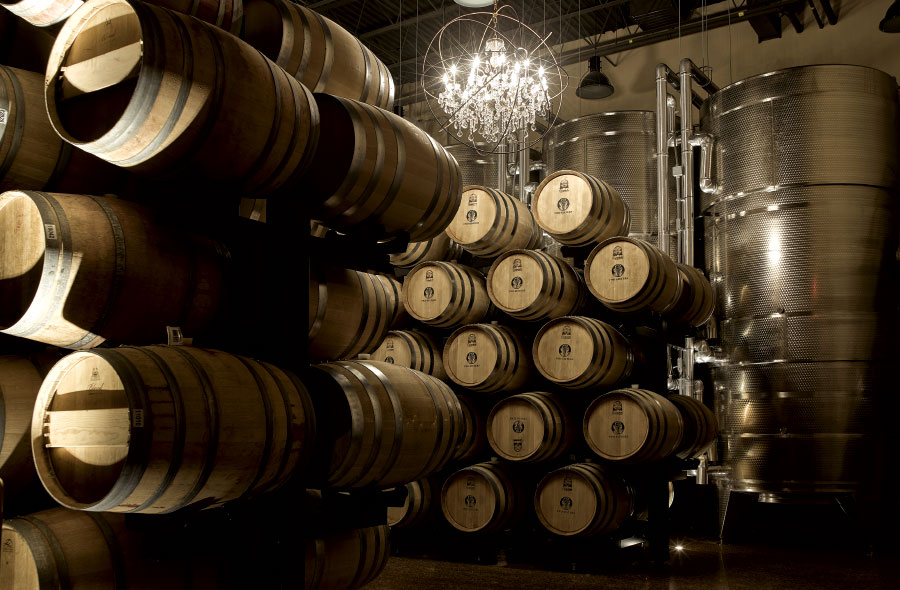
Nor is it easy, of course, to run a family business. The sisters keep things separate as much as possible between work and family. “Melissa has four kids, and I have three,” said Angela. “We have very busy lives, so we try to give each other a lot of space outside of work.”
But they also communicate – a lot.
“We really make an effort to listen to each other. We listen, we talk things through and when there is a disagreement between us, we refer to our team and our lead staff to get their feedback,” said Angela. “They see things we don’t always see. It allows for a different perspective and helps make space for good opportunities.”
With more than a decade in the business, they have plenty of advice for those thinking of beginning something similar. “Start small and focus on quality, because quality is always appreciated and that gives you the longevity in this business,” Angela said. “It’s hard to be high-volume and then scale to something premium. Just start with premium.”
Listen to all customer feedback and react quickly when changes need to be made, she adds. If a wine event doesn’t result in sales, for instance, something isn’t working. “Every year, we change things a little bit with our wine education programs and tours, just to be sure we aren’t stale,” Angela said. “We are constantly observing and listening to what people have to say.”
The sisters have no intention of stepping back from the winery any time soon, but they also realize that as a family-owned business, there needs to be a plan for future generations. With that in mind, their children are already involved in many aspects of the business, working at the winery every summer.
“We intend to stay family-owned for the second and third generation and beyond,” Angela said. “This is a long-term game.”

